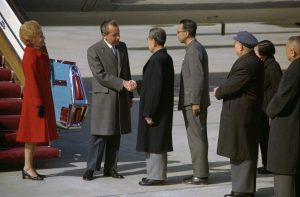In a recent comment on North Korea and Russia’s “close cooperation,” Russian Foreign Minister Sergey Lavrov claimed that China has not questioned the Moscow-Pyongyang partnership. He again accused the West of attempting to “drive a wedge” between Moscow and Beijing by claiming that the latter disapproves of North Korea’s support for the Russian invasion of Ukraine.
Lavrov’s attempt to refute rumors of China’s discontent is not the most curious part of his statement. The Russian foreign minister told journalists there is a “simple calculation” at work: Western politicians are trying to “help wrap up the Ukraine story, accommodate some of Russia’s legal demands, and use Russia in a coalition against China” (emphasis added).
Vladimir Dzhabarov, deputy chairman of the Russian Federation Council Committee on International Affairs, echoed the statement, suggesting that the incoming Trump administration is considering normalizing relations with Moscow if it distances itself from Beijing. The senator emphasized that Russia “does not abandon friends or ever betray them” nor “become friends against anyone.”
Does Moscow genuinely believe a “reverse Nixon” is a possibility? If the claim is merely propaganda, what are its goals?
Kommersant, the pro-Kremlin daily that published Lavrov’s statement, published an article more than four years ago on July 24, 2020, titled, “Russia has been invited to be friends against China.” The piece suggested that the United States may invite Russia into an anti-China coalition and referenced a speech given by then-Secretary of State Mike Pompeo. In remarks on July 23, 2020, Pompeo warned of the danger Beijing posed to the free world and called for a new alliance of like-minded democracies to counter the challenge.
He was then asked if the U.S. could align with Russia against China, as Nixon partnered with the PRC against the Soviet Union in 1972.
Pompeo confirmed “there’s that opportunity” to make the world safer by working with Russia on issues of mutual strategic importance, like nonproliferation. He added that the Chinese had recently declined to participate in an arms control dialogue.
Pompeo’s statement fell short of the sensationalized “invitation” mentioned in the Kommersant headline. The proposal’s non-existence did not, however, stop the Kremlin from rejecting it in harsh words and describing it as contradicting traditions of diplomacy.
Lavrov is similarly likely exaggerating the current state of affairs. It is true that Trump has recently proclaimed his desire and ability to “un-unite” the authoritarian giants. The U.S. president-elect even mentioned that the two are “natural enemies,” alluding to Moscow’s worries over potential Chinese colonization of its vast Siberian territory.
Much has been written about weak spots in the Sino-Russian relationship, including the historical border dispute, a vast trade imbalance, intellectual property theft, Beijing’s growing influence in Central Asia and the Arctic, and unbridgeable cultural differences. However, many of these alleged weaknesses, including Trump’s point about Siberia, have been overestimated.
2024 is not 1972: There is no serious weakness reminiscent of the 1969 border clashes or the ideological Sino-Soviet split that could be exploited via U.S. triangular diplomacy this time around.
Moscow knows this. So does it truly believe that the incoming Trump administration hopes to pit Moscow against Beijing in an anti-China grouping?
Unlikely. Even if the Trump administration manages to broker an end to the war in Ukraine, Moscow’s sins will not be forgotten by the West. The United States and European Union have greatly expanded sanctions imposed on Russia in the wake of its invasion of Crimea in 2014. Even if Trump decides to lift them as a part of a settlement in Ukraine, Russia will be a pariah as long as Putin is in power. Russia will remain, as George Kennan put it, the country with which the U.S. will “never be able to cooperate successfully” because it sees the West as an enemy and “would engage in a protracted battle to limit Western power.”
In other words, Russia is not and will not be one of the “like-minded democracies” that Pompeo called on to stand up to China. Despite Trump’s alleged “soft spot” for Putin, leaders in both Washington and Moscow are aware of this. Lavrov’s announcement is far-fetched at best.
Still, there are reasons why this message is surfacing now. First, Lavrov’s false flag helps Moscow affirm its loyalty to Beijing. Second, the message signals to the Trump administration that war-ending negotiations will involve hard concessions from the West and Ukraine. Lavrov has made it clear that Moscow would be unhappy with only “some” of its “legal[ly justified] demands” met.
Finally, for the Russian domestic audience that is growing exhausted with the war, the message creates the perception that Russia is still indispensable in balancing the relationship between the U.S. and China. This reminds the Russian public that the war in Ukraine is about maintaining Russia’s status as a great power whose enemies even plead for its help.
Moscow does not need to believe what it says to achieve its goals. Claiming to believe it does the job just fine.

































